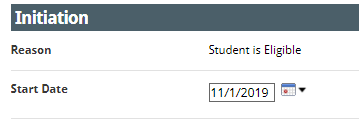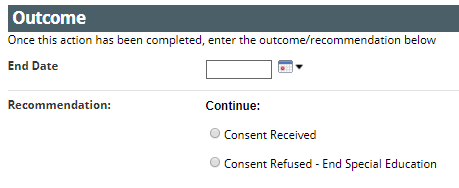Parent Consent
Consent for Initial Provision of Special Education Services
The district must obtain informed written consent from the parent/guardian/age of majority student prior to the initiation of special education and related services. This requirement applies to the initial provision of special education and related services only. Informed consent for the initial provision of special education and related services as described under 34 CFR § 300.300(b)(1) states parents must be provided a full explanation of what special education and related services include and the types of services their child might need; not the exact program of services that would be included in an IEP to be developed for their child.
As mentioned above, prior to the implementation of the Initial IEP, written consent for the initial provision of special education services MUST be obtained. If, following an initial evaluation, the team determines that the student is eligible for special education, an initial IEP will be drafted and proposed. Following the presentation and discussion of the IEP, the IEP team will sign the signature page of the IEP indicating their participation in the meeting. Following the development of the initial IEP the parent/guardian/age of majority student will be provided Prior Written Notice (PWN) which includes a description of each proposed or refused special education action. In addition, this PWN will identify that the IEP will be implemented upon receipt of the signed written consent.

Upon the parent/guardian/age of majority student’s receipt of the PWN, the Case Manager will request the parent’s/guardian’s/age of majority student’s signature on the Consent for Initial Provision of Special Education Services document. The district must make reasonable efforts to obtain informed written consent from the parent/guardian/age of majority student. Each attempt to obtain this informed written consent must be documented in the Contact Log in EnrichIEP.
Enrich IEP will automatically create a Pending: Consent for Initial Provision of Services when the Outcome Recommendation for an Initial Eligibility Determination is “Eligible; Initial.”

To create the Consent for Initial Provision of Special Education Services document in Enrich IEP, the Case Manager will first navigate to the student’s Programs tab. Once on the student’s Programs tab, click “Create” next to the “Pending: Consent for Initial Provision of Services”.

Once within the document, enter the Initiation Start Date (typically the date the user begins completing the document).

Select the type of plan from the dropdown box.

Enter the name of the individual to whom the Consent for Initial Provision of Services should be returned, and select the address to which the Consent document should be returned.

Following receipt of the Parent’s/Guardian’s/Age of Majority Student’s signature on the Consent for Initial Provision of Special Education Services document the Case Manager will enter the Parent’s/Guardian’s/Age of Majority Student’s response in the Outcome section of the Consent for Initial Provision of Services and the date the response was received will be entered as the End Date.

In the event that the Case Manager is unable to obtain a response from the Parent/Guardian/Age of Majority Student within 30 calendar days of the meeting, the Case Manager will choose “Consent Refused – End Special Education” as the Outcome Recommendation. The End Date entered will represent 30 calendar days after the date of the Initial Eligibility Meeting. All attempts to obtain written consent must be documented in the “Contact Log” of Enrich IEP.
NOTE: In the event the Parent/Guardian/Age of Majority Student does not attend the Initial IEP meeting and the Consent for Initial Provision of Special Education Services document is signed after the IEP meeting date, the Case Manager will update the IEP start date on the draft IEP to reflect the first school day after the school receives the signed Consent for Initial Provision of Special Education Services document. After updating this date, the IEP will be finalized.
Copies of all documents will be provided to the parent(s)/guardian(s)/Age of Majority student.
Once an IEP has been completed and consent for services has been obtained from the parents, the child’s IEP must be accessible to each regular education teacher, special education teacher, related services provider, and any other service provider who is responsible for its implementation. Regardless of whether an individual participates in the IEP meeting or is excused, all individuals who are providing education to the child (regular education teacher, special education teacher, related service provider, and any other service provider who is responsible for implementation of the IEP) must be informed by the IEP team of (1) his or her specific responsibilities related to implementing the child’s IEP, and (2) the specific accommodations, modifications, and supports that must be provided for the child in accordance with the IEP (34 CFR § 300.323(d)(2)).
If the parent/guardian/age of majority student fails to respond to the request for the Consent for Initial Provision of Special Education services or refuses consent for the initial provision of services, the LEA may not use mediation or due process procedures in order to obtain agreement or a ruling that the services may be provided to the child. However, in such cases, the LEA is not considered to be in violation of the requirement to make available a FAPE to the child for the failure to provide the child with the services for which the LEA requests consent. Under these circumstances, the LEA is not required to convene an IEP team meeting or develop an IEP for the child. In the situation where the parent fails to respond or refuses consent, this would also exclude the child from the IDEA discipline protections that are provided to students when an LEA suspects the child to be a child with a disability.

